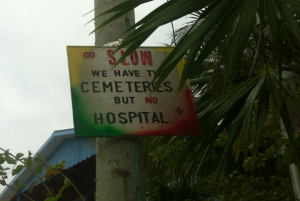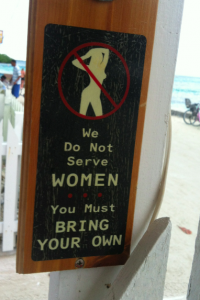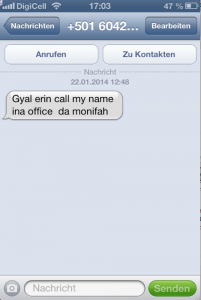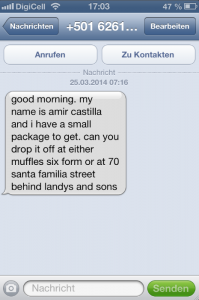I have arrived safely on Caye Caulker, a small island in the Caribbean Sea where about 1500 people live permanently. I have chosen this site as it is not only small and so I hope to get into community life more easily, I am also interested in how global tourism affects language practices – Caye Caulker is famous with divers worldwide and a popular traveller hang-out – as to see whether impacts from transnational discourses, practices of mixing and ethnic diversity are maybe not urban-only phenomena.
Getting first impressions of the linguistic landscape of Caye Caulker, I am a bit afraid that the official statement that Belize, having been a British colony until 1982, is an English-speaking country may have become true on the island. This may be a bit problematic for my research, where I plan to focus on what people do if their languages (English, Spanish, Creole, Garifuna, Kechi Maya, Mopan Maya, German, Mandarin, Lebanese and all the other languages that are officially part of the Belizean language make-up) do not necessarily fit in with their ethnic affiliation. Belize has many families of multi-ethnic origin and I don’t even know if many people have something they would call their ‚ethnic‘ identity, apart from their official Belizean citizenship . On the first days, I actually do not see much of linguistic diversity. Close to all shop and street signs are in English – even if they do carry local flavour in their style:
On the northern end of the island, many bars, restaurants and hotels are located and again, with few exceptions in single words that are in Spanish or Creole or Chinese, or names of the owners (who frequently are Spanish), close to everything is written in English, sometimes also involving creative sexist plays of interest to the linguist:
All people who talk to me – restaurant owners, scuba dive shop employees, street vendors – speak in English and I have no problem whatsoever understanding them and they have no problem understanding me (with the exception of some of the Chinese supermarket employees). So maybe there is no language mixing, code-switching and multilingualism because everyone has shifted to English?
Luckily, my fears about an English-only speaking Belize vanish soon. I hear many people on the streets using Creole and even more who speak Spanish. My first days in the school even confirm what Genevieve Escure has said about Belize , namely that English seems to be close to no one’s first language (Escure 1997:39). Teachers tell me that pupils have difficulties to use English in class – and they enter this school at age 13 or 14. Although all pupils speak English with me, when I do my first classroom observation, I actually have strong difficulties understanding what the pupils are saying. The teachers and the pupils tell me that they always use Creole (even though I am told that many pupils speak Spanish at home) – I will have to get used to their way of talking and do my recordings to study this! I am not sure about their definition of Creole. As is common in many parts of the world, the written and spoken forms of language are simply very different.
Another moment when I feel relieved that my research on multilingualism in Belize is not based on a phantasm is when I buy a new sim card for my telephone. When I switch it on for the first time, I receive three messages for the person who must have had the number before me:
Ok, yes, English is a language that is written in Belize and that is also spoken but there are certainly more things to discover…
References:
Escure, Geneviève. 1997. Creole and Dialect Continua: Standard Acquisition Processes in Belize and China. Amsterdam:Benjamins.







 Die
Die